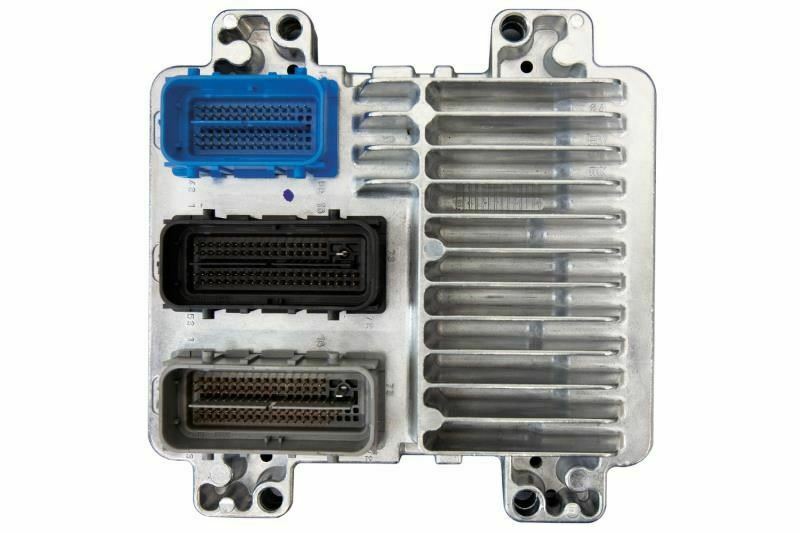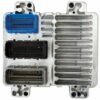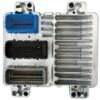Is Your GMC Canyon Running Rough? The ECM Might Be the Culprit.
The Engine Control Module (ECM), often called the engine’s brain, is the central command center for your 2009-2012 GMC Canyon. It meticulously manages everything from fuel injection and spark timing to transmission shifts and emissions control. When this critical component begins to fail, it can cause a cascade of confusing and frustrating problems, leaving your reliable truck feeling unpredictable and unsafe. If you’re experiencing baffling engine issues, a faulty ECM is a likely cause, and this direct-fit, VIN-programmed module is the definitive solution to restore your truck’s performance and dependability.
Diagnosing a Failing 2009-2012 Canyon ECM
A failing engine computer can manifest in numerous ways, often mimicking other sensor or component failures. This can lead to expensive and time-consuming guesswork, replacing parts that aren’t actually broken. Before you spend another dollar on spark plugs or sensors, review these common symptoms of a bad ECM in your GMC Canyon or related GM vehicle. Recognizing these signs is the first step toward a correct diagnosis and a lasting repair.
From the Diagnostic Bay
We recently had a 2011 Canyon in the shop with a persistent, random misfire that the owner had been chasing for months. He had replaced plugs, coils, and even a fuel injector based on generic codes. When we connected our professional scan tool, we noticed intermittent communication drops with the engine computer. We checked the power and ground connections to the ECM, which were solid. This pointed directly to an internal failure. After installing a VIN-programmed 2009-2012 Canyon ECM like this one, the communication was stable, the misfire was gone, and the truck ran smoother than it had in years. Sometimes, the problem isn’t the components; it’s the computer controlling them.
Common Symptoms of ECM Failure
- ✔ Check Engine Light: An illuminated Check Engine Light is the most obvious sign. Codes related to ECM internal memory errors (like P0601-P0606), sensor reference voltage, or communication failures are strong indicators.
- ✔ Engine Stalling or Misfiring: The engine may stall for no reason, either while driving or at idle. You might also experience rough idling or noticeable engine misfires as the ECM fails to properly control spark and fuel.
- ✔ No-Start Condition: One of the most severe symptoms is the engine refusing to start at all. If the starter cranks but the engine won’t turn over, the ECM may not be commanding the fuel pump or ignition system to activate.
- ✔ Poor Performance and Fuel Economy: A significant and sudden drop in gas mileage or a noticeable lack of power during acceleration can be traced back to an ECM that is no longer calculating the optimal air-fuel mixture.
- ✔ Inconsistent Transmission Shifting: The ECM works with the Transmission Control Module (TCM). A faulty ECM can send incorrect data, leading to harsh, delayed, or erratic shifting patterns.
- ✔ Apparent Failure of Multiple Sensors: If your scan tool shows codes for multiple, unrelated sensors failing simultaneously, the problem is often not the sensors themselves, but the ECM that provides their reference voltage.
The Perfect Solution: VIN-Programmed and Ready to Install
This isn’t just a replacement part; it’s a complete solution. We take the guesswork out of the repair by pre-programming this module specifically for your truck using your Vehicle Identification Number (VIN). This critical step ensures that the computer is loaded with the latest, most stable software from GM and is configured for your vehicle’s specific options, such as engine size, transmission type, and emissions equipment. This guarantees a seamless installation and proper function right out of the box.
Wide Compatibility Across the GM Family
This versatile E38 ECM is a direct replacement for a wide range of GM trucks and SUVs. It is fully interchangeable with the following service numbers:
12636659, 12639300, 1263605, 12628993, 12628911, 12625453, 12622175, 12630464, 12678512
While this listing focuses on the 2009-2012 Canyon ECM, this module also fits models like the Chevrolet Colorado, Hummer H3, Cadillac CTS, Corvette, and more. Please verify the part number and consult the detailed fitment list to ensure compatibility with your specific vehicle.
Frequently Asked Questions
Why do I need to provide my VIN?
Your vehicle’s VIN is like its fingerprint. It tells us the exact engine, transmission, tire size, and other options your truck was built with. Programming the ECM with your VIN ensures all these systems are controlled correctly by the new module, preventing compatibility issues and ensuring optimal performance.
Is this a “plug and play” installation?
Yes, for the most part. Because we pre-program the module, you will not need a trip to the dealer for software flashing. You simply install the unit, and in most cases, perform a simple security relearn procedure (often called a “key relearn”) which can be done in your driveway without any special tools. Instructions are widely available online for this process.
How do I know for sure my ECM is the problem?
The best way to be 100% certain is to have a qualified technician perform a diagnostic. They can check for specific ECM-related trouble codes and verify that the power and ground circuits to the module are intact. However, if you are experiencing several of the symptoms listed above, especially communication errors or multiple sensor codes, a faulty ECM is the most probable cause.
Will this fix my check engine light?
If the check engine light is caused by an internal failure of your original ECM, then yes, this replacement module will resolve the issue and turn off the light after installation. If the light is on for another reason (e.g., a bad oxygen sensor), that issue will need to be addressed separately.
Where is the ECM located on my 2009-2012 GMC Canyon?
On the 2009-2012 GMC Canyon and Chevrolet Colorado, the Engine Control Module is typically located in the engine bay, mounted to the right-hand (passenger side) firewall.


